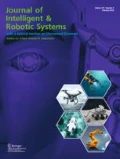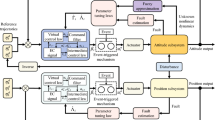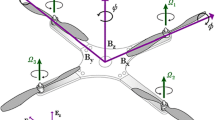Abstract
This paper presents a novel learning-based fault tolerant tracking control approach by using an extended Kalman filter (EKF) to optimize a Mamdani fuzzy state-feedback tracking controller. First, a robust state-feedback tracking controller is designed as the baseline controller to guarantee the expected system performance in the fault-free condition. Then, the EKF is employed to regulate the shape of membership functions and rules of fuzzy controller to adapt with the working conditions automatically after the occurrence of actuator faults. Next, based on the modified fuzzy membership functions and rules, the baseline controller is readjusted to properly compensate the adverse effects of actuator faults and asymptotically stabilize the closed-loop system. Finally, in order to verify the effectiveness of the proposed method, several groups of numerical simulations are carried out by comparing the performance of a tracking control scheme and the presented technique. Simulation results demonstrate that the proposed method is effective for optimizing the fuzzy tracking controller on-line and counteracting the side effects of actuator faults, and the control performance is significantly improved as well.
Similar content being viewed by others
References
Zhang, Y.M., Chamseddine, A.: Fault tolerant flight control techniques with application to a quadrotor UAV testbed. In: Automatic Flight Control Systems-Latest Developments, InTech, pp. 119–150 (2012)
Alexis, K., Nikolakopoulos, G., Tzes, A.: Switching model predictive attitude control for a quadrotor helicopter subject to atmospheric disturbances. Control Eng. Pract. 19(10), 1195–1207 (2011)
Castillo, P., Dzul, A., Lozano, R.: Real-time stabilization and tracking of a four-rotor mini rotorcraft. IEEE Trans. Control Syst. Tech. 12(4), 510–516 (2004)
Dierks, T., Jagannathan, S.: Output feedback control of a quadrotor UAV using neural networks. IEEE Trans. Neural Netw. 21(1), 50–66 (2010)
Hoffmann, G.M., Huang, H., Waslander, S.L., Tomlin, C.J.: Precision flight control for a multi-vehicle quadrotor helicopter testbed. Control Eng. Pract. 19(9), 1023–1036 (2011)
Yuan, C., Zhang, Y.M., Liu, Z.X.: A survey on technologies for automatic forest fire monitoring, detection and fighting using UAVs and remote sensing techniques. Can. J. For. Res. 45(7), 783–792 (2015)
Murphy, D.W., Cycon, J.: Applications for mini VTOL UAV for law enforcement. In: Enabling Technologies for Law Enforcement and Security, International Society for Optics and Photonics, pp. 35–43 (1999)
Metni, N., Hamel, T.: A UAV for bridge inspection: Visual servoing control law with orientation limits. Autom. Constr. 17(1), 3–10 (2007)
Mellinger, D., Michael, N., Kumar, V.: Trajectory generation and control for precise aggressive maneuvers with quadrotors. Int. J. Robot. Res. 31(5), 664–674 (2012)
Shakernia, O., Ma, Y., Koo, T.J., Sastry, S.: Landing an unmanned air vehicle: Vision based motion estimation and nonlinear control. Asian J. Control 1(3), 128–145 (1999)
Gomez-Balderas, J.E., Flores, G., Carrillo, L.G., Lozano, R.: Tracking a ground moving target with a quadrotor using switching control. J. Intell. Robot. Syst. 70(1–4), 65–78 (2013)
Rinaldi, F., Chiesa, S., Quagliotti, F.: Linear quadratic control for quadrotors UAVs dynamics and formation flight. J. Intell. Robot. Syst. 70(1–4), 203–220 (2013)
Guerrero, J.A., Garcia, P.C., Challal, Y.: Quadrotors formation control. J. Intell. Robot. Syst. 70(1–4), 221–231 (2013)
Saska, M., Krajník, T., Vonásek, V., Kasl, Z., Spurný, V., Přeuc̆il, L.: Fault-tolerant formation driving mechanism designed for heterogeneous MAVs-UGVs groups. J. Intell. Robot. Syst. 73 (1–4), 603–622 (2014)
Escareño, J., Salazar, S., Romero, H., Lozano, R.: Trajectory control of a quadrotor subject to 2D wind disturbances. J. Intell. Robot. Syst. 70(1–4), 51–63 (2013)
Zhang, Y.M., Jiang, J.: Bibliographical review on reconfigurable fault-tolerant control system. Annual Rev. Control 32(2), 229–252 (2008)
Zhang, Y.M., Chamseddine, A., Rabbath, C.A., Gordon, B.W., Su, C.Y., Rakheja, S., Fulford, C., Apkarian, J., Gosselin, P.: Development of advanced FDD and FTC techniques with application to an unmanned quadrotor helicopter testbed. J. Frankl. Inst. 350(9), 2396–2422 (2013)
Li, T., Zhang, Y.M., Gordon, B.W.: Passive and active nonlinear fault-tolerant control of a quadrotor unmanned aerial vehicle based on the sliding mode control technique. Proc. Inst. Mech. Eng. Part I: J. Syst. Control Eng. 227(1), 12–23 (2013)
Amoozgar, M.H., Chamseddine, A., Zhang, Y.M.: Experimental test of a two-stage Kalman filter for actuator fault detection and diagnosis of an unmanned quadrotor helicopter. J. Intell. Robot. Syst. 70 (1–4), 107–117 (2013)
Chamseddine, A., Theilliol, D., Zhang, Y.M., Join, C., Rabbath, C.A.: Active fault-tolerant control system design with trajectory re-planning against actuator faults and saturation: Application to a quadrotor unmanned aerial vehicle. Int. J. Adapt. Control Signal Proces. 29(1), 1–23 (2015)
Milhim, A.B., Zhang, Y.M., Rabbath, C.A.: Gain scheduling based PID controller for fault tolerant control of a quad-rotor UAV. In: AIAA Infotech Aerospace, pp. 20–22. Atlanta (2010)
Izadi, H.A., Gordon, B.W., Zhang, Y.M.: A data-driven fault tolerant model predictive control with fault identification. In: Proceedings of the Control and Fault-Tolerant Systems (SysTol) Conference, pp. 732–737. Nice, France (2010)
Simon, D.: Sum normal optimization of fuzzy membership functions. Intern. J. Uncertain. Fuzziness Knowl. Syst. 10(4), 363–384 (2002)
Jiménez, A., Al-Hadithi, B.M., Matía, F.: Extended Kalman filter for the estimation and fuzzy optimal control of Takagi-Sugeno model. In: Fuzzy Control. Theory Appl., pp. 91–110 (2011)
Berstecher, R.G., Palm, R., Unbehauen, H.D.: An adaptive fuzzy sliding-mode controller. IEEE Trans. Ind. Electron 48(1), 18–31 (2001)
Tao, C.W., Taur, J.S., Chen, Y.C.: Design of a parallel distributed fuzzy LQR controller for the twin rotor multi-input multi-output system. Fuzzy Sets Syst. 161(15), 2081–2103 (2010)
Truong, D.Q., Ahn, K.K.: Force control for press machines using an online smart tuning fuzzy PID based on a robust extended Kalman filter. Expert Syst. with Appl. 38(5), 5879–5894 (2011)
Lai, L.C., Yang, C.C., Wu, C.J.: Time-optimal control of a hovering quad-rotor helicopter. J. Intell. Robot. Syst. 45(2), 115–135 (2006)
Abdolhosseini, M., Zhang, Y.M., Rabbath, C.A.: An efficient model predictive control scheme for an unmanned quadrotor helicopter. J. Intell. Robot. Syst. 70(1–4), 27–38 (2013)
Stevens, B.L., Lewis, F.L.: Aircraft Control and Simulation. Wiley (2003)
Yu, X., Jiang, J.: Hybrid fault-tolerant flight control system design against partial actuator failures. IEEE Trans. Control Syst. Tech. 20(4), 871–886 (2012)
Liao, F., Wang, J.L., Yang, G.H.: Reliable robust flight tracking control: An LMI approach. IEEE Trans. Control Syst. Tech. 10(1), 76–89 (2002)
Apkarian, P., Tuan, H.D., Bernussou, J.: Continuous-time analysis, eigenstructure assignment, and H 2 synthesis with enhanced linear matrix inequalities (LMI) characterizations. IEEE Trans. Autom. Control 46(12), 1941–1946 (2001)
Ghaoui, L.E.l., Feron, E., Balakrishnan, V.: Linear matrix inequalities in system and control theory. Phila. Soc. Ind. Appl. Math. 15, 1 (1994)
Sugeno, M., Yasukawa, T.: A fuzzy-logic-based approach to qualitative modeling. IEEE Trans. Fuzzy Syst. 1(1), 7–31 (1993)
Ahn, K.K., Truong, D.Q.: Online tuning fuzzy PID controller using robust extended Kalman filter. J. Process Control 19(6), 1011–1023 (2009)
Grewal, M.S., Andrews, A.P.: Kalman filtering: Theory and Practice using MATLAB. Wiley (2011)
Fan, J.H., Zhang, Y.M., Zheng, Z.Q.: Robust fault-tolerant control against time-varying actuator faults and saturation. Control Theory Appl. 6(14), 2198–2208 (2012)
Author information
Authors and Affiliations
Corresponding author
Rights and permissions
About this article
Cite this article
Liu, Z., Yuan, C., Zhang, Y. et al. A Learning-Based Fault Tolerant Tracking Control of an Unmanned Quadrotor Helicopter. J Intell Robot Syst 84, 145–162 (2016). https://doi.org/10.1007/s10846-015-0293-0
Received:
Accepted:
Published:
Issue Date:
DOI: https://doi.org/10.1007/s10846-015-0293-0




